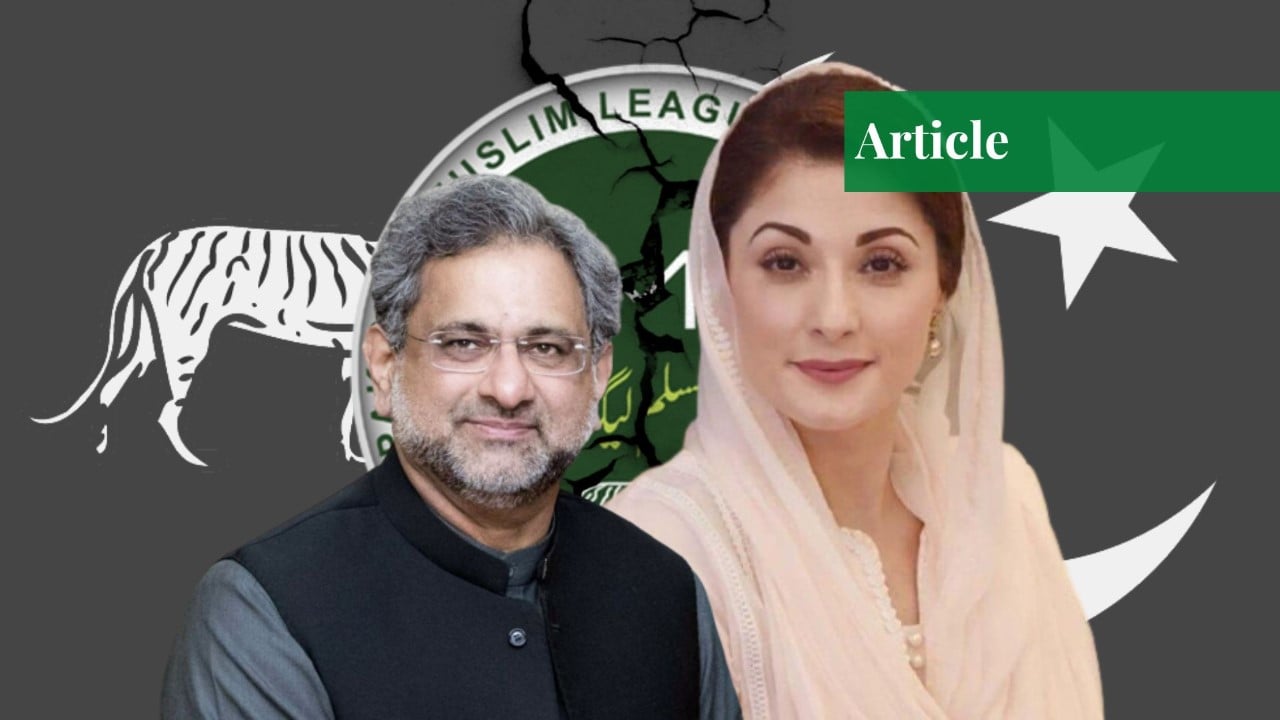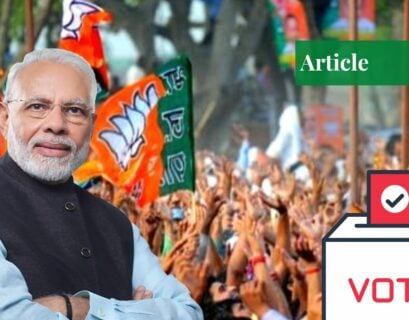Ms Afifa Iqbal has a keen interest in identity politics, colonialism and post-colonial development. She is currently working as a Research Assistant at ITU while pursuing her postgraduate studies in Development, Technology and Policy. She is a Gold Medalist in Political Science from the University of Punjab.
Introduction
The decision of ex-premier Shahid Khaqan Abbasi to resign as PML-N’s senior vice president has raised questions about the party’s leadership structure and its prospects in the upcoming general elections. Earlier, the appointment of Maryam Nawaz as ‘senior vice president and chief organiser’ of the party has already signaled a shift in the party’s internal organization and vision for the future.
These shifts were further strengthened by Abbasi’s participation in conferences and talks organized by disillusioned former finance minister Miftah Ismail and others. Some of these speculations were put to rest by Abbasi himself when he stated that he stepped down to give the newly minted senior vice president, Maryam Nawaz, an “open field”. However, this still leaves much to the imagination.
Prima Donna of the House of Sharif: Maryam Nawaz
Maryam Nawaz has existed in the shadows of the PML-N’s supremo and patriarch Nawaz Sharif for much of her ‘political career’. Given the dynastic nature of the PML-N, her political role—no matter how cosmetic—has always existed. Despite her relative lack of visibility in the past, Ms. Sharif’s birth to a political family has always positioned her as a potential political figure.
Her political stature grew in the wake of Nawaz Sharif’s disqualification and subsequent flight to London, sending a clear signal that she was the heir apparent instead of her uncle Shahbaz Sharif or his son Hamza Shahbaz Sharif. As a result, she became the mouthpiece of Nawaz Sharif amidst his political censorship. In a way, she was a projection of Nawaz Sharif and his proxy carrying out the party’s affairs in his name.
Her unwavering loyalty to her father can be gauged from her statements in a recent meeting of PML-N’s youth wing. She reportedly stated that the current coalition government was not her government, as her government would be the one led by her father. Ms. Sharif’s elevation to the positions of senior vice president and chief organiser of the party is bound to have some implications for the future of the party.
Her aesthetics, political expression, and ethos will likely influence the party’s election campaign and engagement with the Pakistan Tehreek-i-Insaf. Maryam Nawaz’s unapologetic embrace of her femininity, use of luxury brands, and defiance of traditional and time-bound concepts of style has redefined the traditional image of a female politician.
In the political landscape of Pakistan that favors the sterile and monotonous persona of female politicians, Ms. Sharif’s vibrant and chic style makes the statement that she has a mind of her own. However, at times, it also comes across as tone-deaf. Her use of luxury brands like Louis Vuitton, Gucci, etcetera., when the economy is in free-fall, suggests a degree of disconnect from the broader public bearing the brunt of hyperinflation.
When coupled with PML-N’s poor economic performance, this could spell serious trouble for the party in the upcoming general elections. Maryam Nawaz’s no holds barred approach to political discourse is a marked departure from the more reserved tone often adopted by female politicians in particular and male politicians in general. It is closer to the confrontational and vitriolic language adopted by the PTI leader Imran Khan. This is evident in her tit-for-tat responses to Imran Khan’s underhanded comments about her.
However, this kind of approach decreases the likelihood of political consensus on issues of national importance, including the economy. While one can argue that Imran Khan’s refusal to work with PML-N and PPP, and his confrontational rhetoric, are largely to blame, Maryam Nawaz’s position as the heir apparent to the throne of PML-N will also have some bearing.
Then there is the question of the political ethos of Maryam Nawaz. Recently, in a bid to absolve herself from the recent economic chaos, she distanced herself from the current government of her uncle and the party president Shahbaz Sharif. However, her inconsiderate expression shows shallow and shrewd political ethos. In another interview with Jirga’s host Saleem Safi, she defended Finance Minister Ishaq Dar’s disastrous economic decisions that have added to the economic malaises of the country and instead reasoned that the people should be thankful to Ishaq Dar.
The convoluted logic and inability to admit her party’s role in the ongoing poly-crisis provide little reassurance to the common man. Parallels have been drawn between Maryam Nawaz’s elevation to the position of senior vice president and the slain Prime Minister Benazir Bhutto’s assumption of the reins of her father’s political party.
It is true that as a woman, Maryam Nawaz is bound to face unwarranted criticism and scrutiny, given the nature of Pakistani politics, just as Benazir Bhutto did. However, it also holds true that aside from this misogynistic and sexist criticism, there is hardly any common ground between her brand of politics and Benazir Bhutto’s politics. The reactionary origins and politics of PML-N and Maryam Nawaz stand in contrast to the ideology-driven origins and politics of the Pakistan People’s Party led by Benazir Bhutto.
The Grand Vizier: Shahid Khaqan Abbasi
Shahid Khaqan Abbasi’s loyalty to Nawaz Sharif is beyond question. His assumption of the premiership after Nawaz Sharif’s disqualification shows the level of trust placed in him by the party’s de facto leader. Like Maryam Nawaz, he stood his ground during the post-2018 ordeal of PML-N.
While responding to a question on the veteran journalist Hamid Mir’s talk show, Capital Talk, he stated that he took the initiative to act as an intermediary between ex-premier Nawaz Sharif and ex-COAS Bajwa to improve their relationship. In the same interview, his restraint while talking about ex-COAS and reconciliatory tone highlights his political disposition towards rapprochement, as compared to Ms. Sharif’s provocative approach.
The Resignation and Impact on Pakistan’s Political Landscape
Shahid Khaqan Abbasi has denied all rumors of leaving the PML-N and forming a new political party. Instead, he has categorically stated that he would only contest elections on PML-N’s ticket and that leaving the party would be a big decision. He further stated that he tendered his resignation to provide an “open field” to Maryam Nawaz.
He was also quoted as saying that he witnessed the problems faced by Benazir Bhutto during her first term due to her differences from her father’s compatriots. During her second term, there were new people around her who helped her evolve. According to Abbasi, Maryam Nawaz would not be able to grow as a leader if he stayed in his position.
Taking into account the political trajectories of both Maryam Nawaz and Shahid Khaqan Abbasi, as well as the current political landscape of Pakistan, Abbasi’s resignation as senior vice president is likely to have more of an impact on the internal politics and organizational ability of PML-N to mobilize supporters, rather than on the policy outcomes and public service delivery.
Even when Abbasi held the formal position, the chokehold of the likes of Ishaq Dar—responsible for the disastrous economic policies of PML-N and antagonism of IMF—remained on the party, and in the reign of Maryam Nawaz, the influence of such people is only going to grow stronger.
Moreover, the de facto influence of a veteran like Shahid Khaqan Abbasi was not due to his formal position in the party, so, he is still likely to remain an influential figure in the party. However, the interaction, if any, between PTI and PML-N is going to be more charged given the proclivity of Maryam Nawaz to match the former premier Imran Khan in his impassioned rhetoric and incendiary tone as compared to the subtle mannerism of Shahid Khaqan Abbasi.
Finally, while Maryam Nawaz might not have the political acumen of Benazir Bhutto and her privileged position is very unlikely to benefit the common woman, she has stood her ground amidst imprisonment, vilification, and smear campaigns which show that she is made of sterner stuff.
Conclusion
In a country with democratized political parties, the decision of Shahid Khaqan Abbasi to tender his resignation to make way for the next generation of political leaders would have signaled a huge shift in the political landscape of the country.
Take, for instance, the decision of the former US House Speaker Nancy Pelosi to withdraw her name from the race of Democratic leadership. It signaled a shift in the intra-party politics of the Democratic Party as well as the political landscape of the US. However, this is hardly the case in Pakistan because of the dynastic nature of political parties as well as the larger political equation.
The resignation of Shahid Khaqan Abbasi and the elevation of Maryam Nawaz within the party ranks will shift the internal dynamics of PML-N to a certain extent, but the policy positions of the party are likely to remain the same. Put simply, the more things change, the more they remain the same in Pakistani politics.
If you want to submit your articles and/or research papers, please check the Submissions page.
The views and opinions expressed in this article/paper are the author’s own and do not necessarily reflect the editorial position of Paradigm Shift.



















